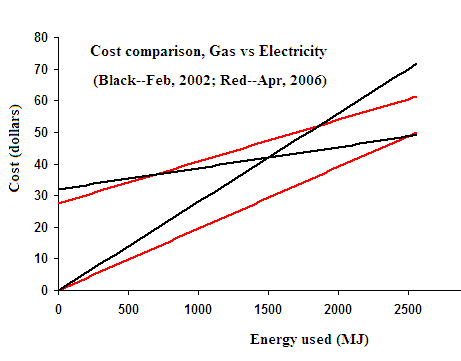
Home Energy Lesson in Physics for Georgians
(A Comparison of the cost per month of Natural Gas versus Electricity in the State of Georgia)
The deregulation of the Natural Gas industry in Georgia has resulted in significant changes to consumers. The average consumer has difficulty comparing the cost of electricity to natural gas in an objective manner. The difficulty derives in part from the unusual units employed by the gas industry (the 'therm' for energy and 'cubic feet' for volume). For that matter, the 'Killowatt-hour' is obscure to many. Thus, for the following, the cost for each is expressed in the same unit of 'millions of Joules' (MJ) of energy used per month; where the Joule is the System International (SI) energy unit of the scientific community.
In constructing the graph, the rate for gas was determined from billing information supplied by Shell (winter of 2001), and computed at 0.65 cents/MJ. Although the cost of gas fluctuates (evidently by small amounts) because of variable energy content, this rate is thought to be reasonable for present purposes. Additionally, the 'cover-charge' necessary for gas to flow each month, was taken from the same Shell bill. It comprises two parts, $26 to Atlanta Gas Light Company and $6 to Shell. The value of this cover charge seems to fluctuate, but appears to have been characterized by a secular trend upward for the last two years.
The rate of 2.75 cents/MJ for electricity was determined from the cost
per kWh, as specified on a Georgia Power bill the same winter month of 2001.

One should note the dramatic difference between the billing practices of these two industries. In particular, electricity is billed only for the amount of energy used. Unlike natural gas, there is no 'upfront' charge for the privilege of being a customer.
Although the slope of the graph for electricity is more than four times that for gas, a substantial amount of electricity must be used before its cost is greater than the gas; i.e., the monthly bill must exceed $42 before gas is the better buy.
Thus we see that the method for computing gas bills is beneficial only to consumers who use large amounts of gas compared to electricity (typically large industries). On annual average, individual consumers tend to use small amounts of gas compared to electricity. For this type of individual, the cost of gas is considerable. For one who is planning a new home construction in Georgia, these are presently-important factors to consider.
Changes in the last four years:
One would hope that things would have gotten better for gas consumers in the last four years, but the graph below shows that just the opposite has happened.

At least on Georgia Power's budget billing, the cost per MJ (free from cover charge) has actually decreased; while the cost of gas per MJ has increased, with a small decrease in the cover charge. The cover charge for gas decreased from $32/month in 2002 to $27.50/month in 2006 for this consumer. Notice that the 'break-even' point for gas-preferred-over electricity has increased from $42/month to $53/month, annual average. The cost for a single daily shower, when one's only source of hot water is gas, is more than a dollar a day!
10 April 2006
Randall D. Peters, PhD
Professor and Chairman, Dept. of Physics
Mercer University, Macon, Georgia